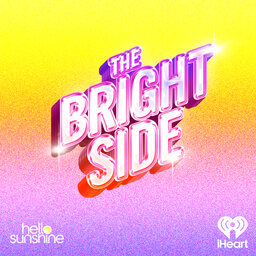Planting Seeds of Kindness with Jeanette Maré
What does it mean to be kind? How can we increase kindness in our communities? And what are the surprising benefits of kindness? Jeanette Maré, kindness researcher and Director of the Science of Kindness Community Collective at the University of Arizona, gives the scoop on how we can better implement kindness into our lives.
In 1 playlist(s)
The Bright Side: A Hello Sunshine Podcast
The Bright Side, the hit podcast from Hello Sunshine, is back for a brand new season! Every Monday, …Social links
Follow podcast
Recent clips

Self-Care Is a Lie We’ve Been Sold—Dr. Pooja Lakshmin Explains What Actually Heals Us
46:53

Understanding GLP-1 Medications: Hormones, Menopause & the Science Behind the Headlines with Dr. Rocio Salas-Whalen
38:19

Replay: Karen Pittman on The Morning Show's Wild New Season and Leaving Imposter Syndrome Behind
41:46
 The Bright Side: A Hello Sunshine Podcast
The Bright Side: A Hello Sunshine Podcast